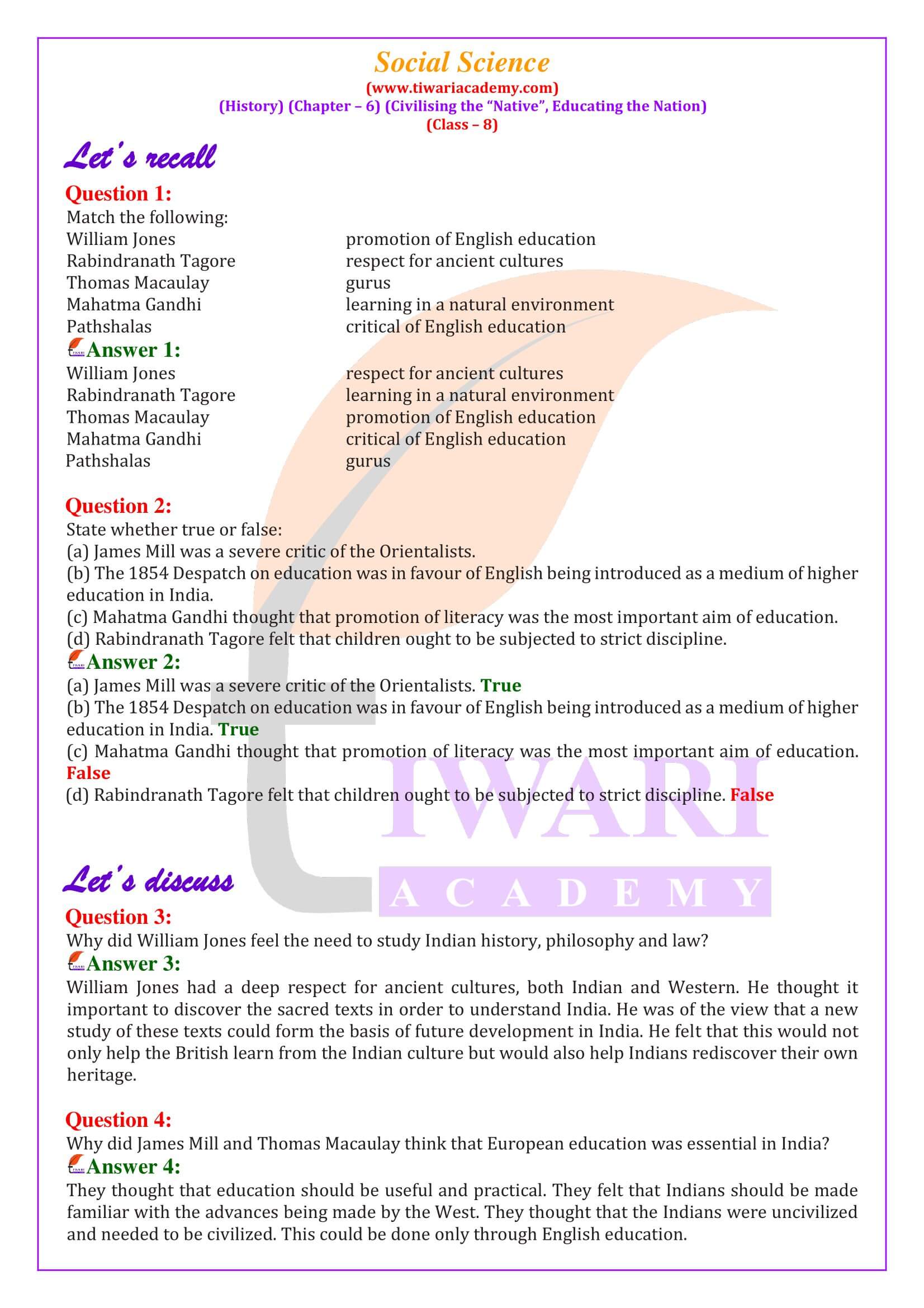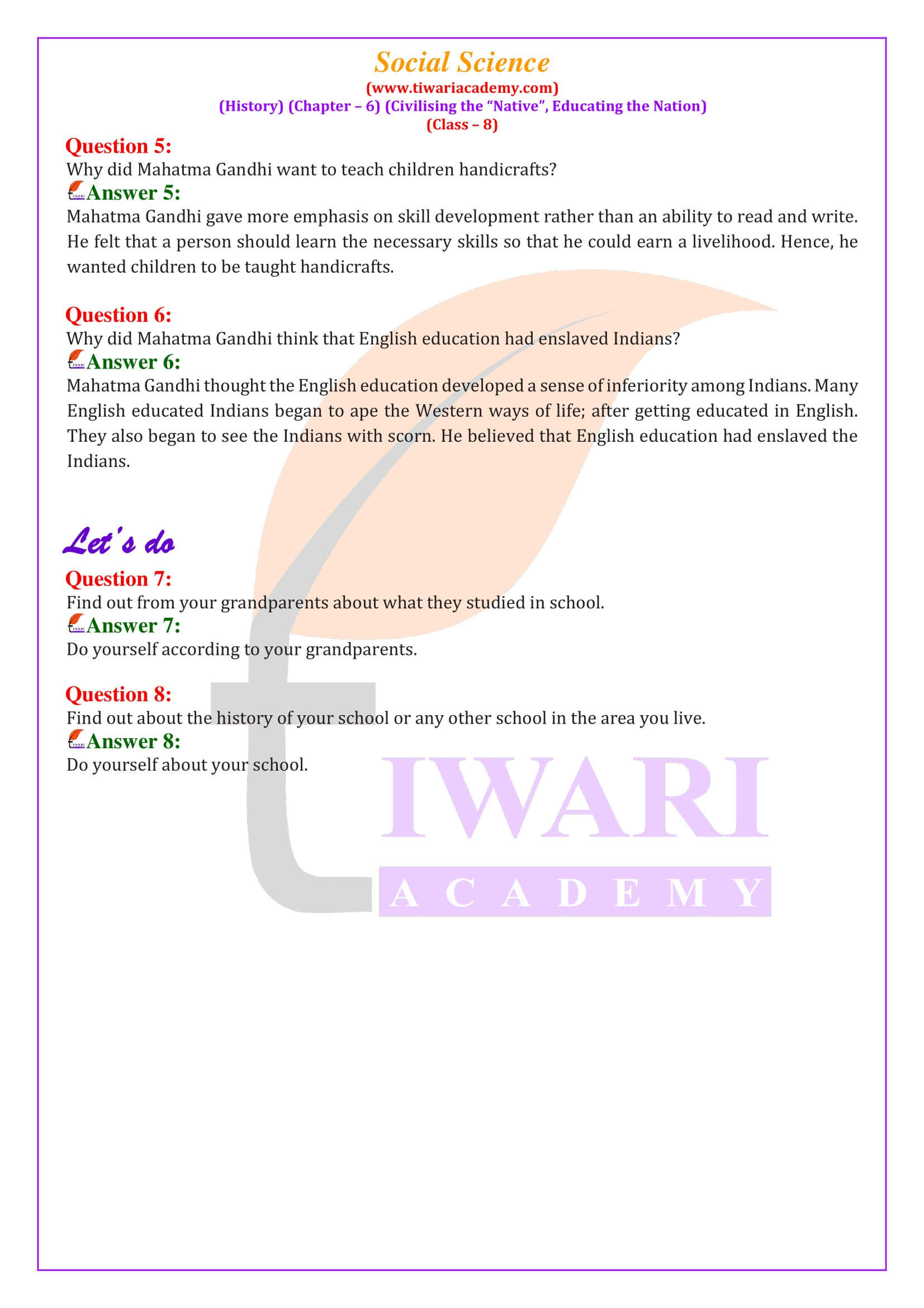NCERT Solutions for Class 8 Social Science History Chapter 6 Civilising the “Native”, Educating the Nation in English and Hindi Medium for new academic session 2024-25. Class 8 History chapter 6 is modified and revised as per the rationalised NCERT books issued for 2024-25 exams.
NCERT Solutions for Class 8 Social Science History Chapter 6
Download latest NCERT Books 2024-25 and NCERT Solutions for other subjects also. Ask Your Questions here or give answers to your friends and classmates questions through Discussion Forum.
Class 8 History Chapter 6 Extra Questions
How was the Indian Education in British rule?
In 1783, a person named William Jones arrived in Calcutta. He had an appointment as a junior judge at the Supreme Court that the Company had set up. In addition to being an expert in law, Jones was a linguist. He had studied Greek and Latin at Oxford, knew French and English, had picked up Arabic from a friend, and had also learnt Persian. At Calcutta, he began spending many hours a day with pandits who taught him the subtleties of Sanskrit language, grammar and poetry.
Soon he was studying ancient Indian texts on law, philosophy, religion, politics, morality, arithmetic, medicine and the other sciences.
What do you know about Asiatick Researches?
Englishmen like Henry Thomas Colebrooke and Nathaniel Halhed were busy discovering the ancient Indian heritage, mastering Indian languages and translating Sanskrit and Persian works into English. Together with them, Jones set up the Asiatic Society of Bengal and started a journal called Asiatick Researches.
Class 8 History Chapter 6 Question Answers
CBSE NCERT Solutions for Class 8 Social Science History Chapter 6 Civilising the “Native”, Educating the Nation is given below in updated form for session 2024-25. Download NCERT Books based on latest Curriculum for CBSE Students.
| Class: 8 | Social Science |
| Subject: | History |
| Chapter 6: | Civilising the “Native”, Educating the Nation |
| Content: | NCERT Question Answers |
| Content Type: | Online Text and Images |
Important Questions on 8th History Chapter 6
State whether true or false: James Mill was a severe critic of the Orientalists.
James Mill was a severe critic of the Orientalists. True
Why did William Jones feel the need to study Indian history, philosophy and law?
William Jones had a deep respect for ancient cultures, both Indian and Western. He thought it important to discover the sacred texts in order to understand India. He was of the view that a new study of these texts could form the basis of future development in India. He felt that this would not only help the British learn from the Indian culture but would also help Indians rediscover their own heritage.
Why did James Mill and Thomas Macaulay think that European education was essential in India?
They thought that education should be useful and practical. They felt that Indians should be made familiar with the advances being made by the West. They thought that the Indians were uncivilized and needed to be civilized. This could be done only through English education.
Why did Mahatma Gandhi want to teach children handicrafts?
Mahatma Gandhi gave more emphasis on skill development rather than an ability to read and write. He felt that a person should learn the necessary skills so that he could earn a livelihood. Hence, he wanted children to be taught handicrafts.
Why did Mahatma Gandhi think that English education had enslaved Indians?
Mahatma Gandhi thought the English education developed a sense of inferiority among Indians. Many English educated Indians began to ape the Western ways of life; after getting educated in English. They also began to see the Indians with scorn. He believed that English education had enslaved the Indians.
Important Notes on 8th History Chapter 6
In order to understand India it was necessary to discover the sacred and legal texts that were produced in the ancient period. For only those texts could reveal the real ideas and laws of the Hindus and Muslims and only a new study of these texts could form the basis of future development in India.
This project would not only help the British learn from Indian culture, but it would also help Indians rediscover their own heritage, and understand the lost glories of their past. In this process the British would become the guardians of Indian culture as well as its masters.
The officials also thought that Hindus and Muslims ought to be taught what they were already familiar with, and what they valued and treasured, not subjects that were alien to them. Only then, they believed, could the British hope to win a place in the hearts of the “natives”; only then could the alien rulers expect to be respected by their subjects. With this object in view a madrasa was set up in Calcutta in 1781 to promote the study of Arabic, Persian and Islamic law; and the Hindu College was established in Benaras in 1791 to encourage the study of ancient Sanskrit texts that would be useful for the administration of the country.






